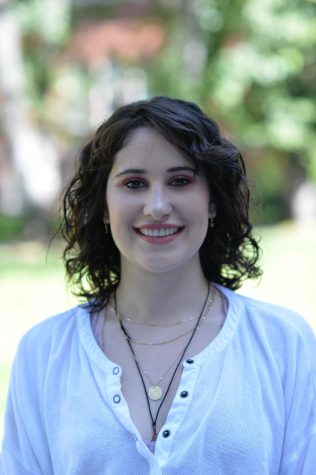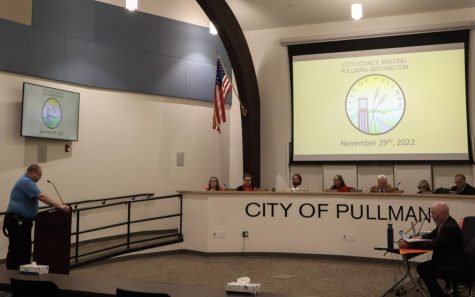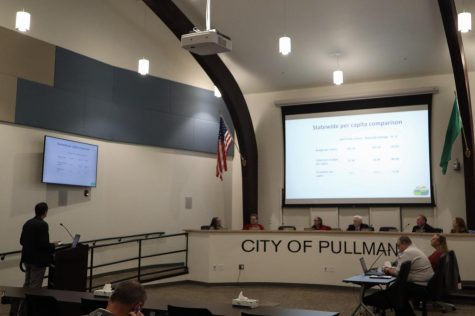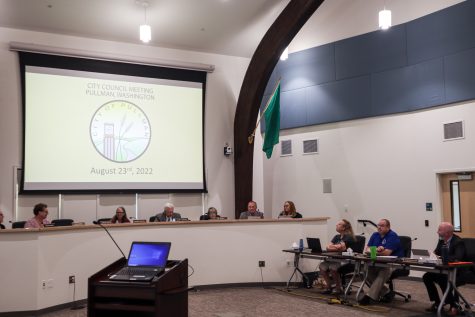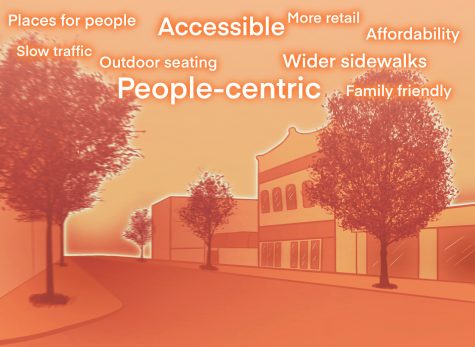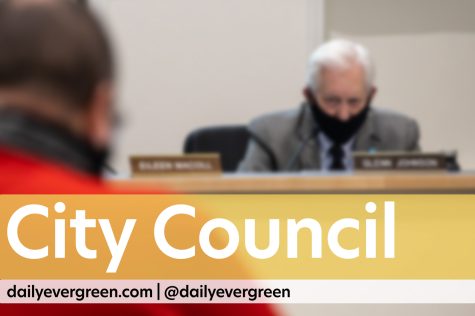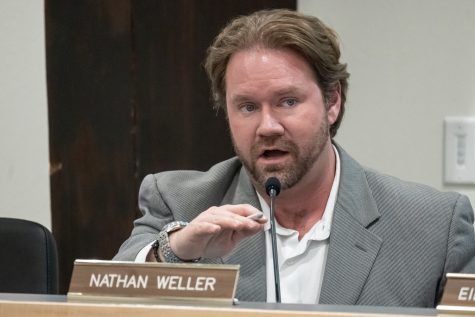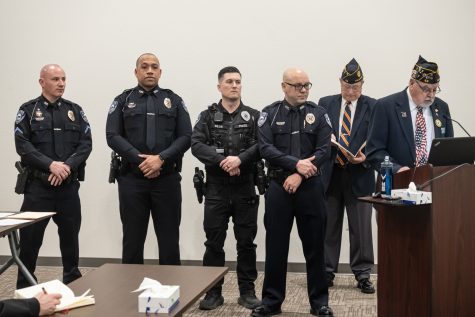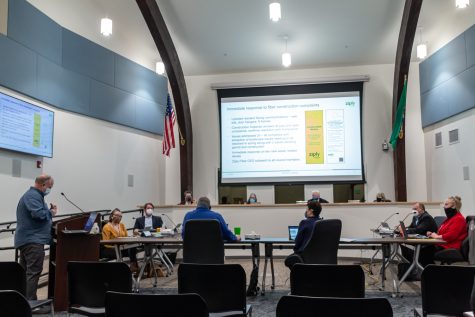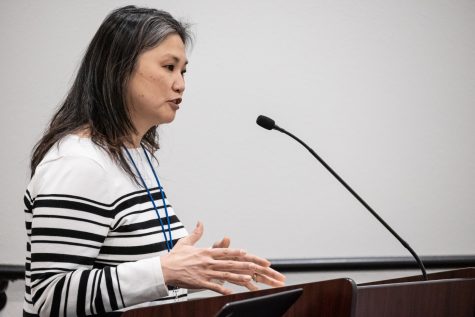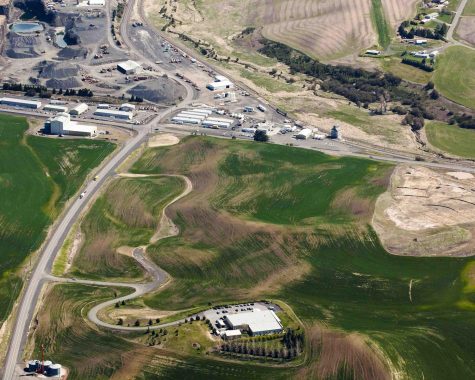Pullman faces economic uncertainty, city finance director says
First months of 2020 show increase in city revenue, but officials say coming months may change that
ZACH RUBIO | DAILY EVERGREEN FILE
Councilmember Al Sorenson said he noticed problems with spacing between barriers and parking spots in the pop-up parking trial.
July 29, 2020
The City of Pullman may face a 12 percent drop in revenue in the coming months, but city officials said they expected worse after months of economic slowdown.
Financial update 2020
Pullman Finance Director Mike Urban gave a presentation during Tuesday’s virtual city council meeting on the financial situation of Pullman, using data collected for the first two fiscal quarters of 2020.
The city spent $10.1 million and earned $10.9 million for quarters one and two of 2020.
Overall sales tax revenue went down from 2019 by $28,511, totaling at $2.3 million for the city, according to graphs presented by Urban.
Liquor and marijuana revenue also increased by 22.2 percent, or by $49,266. Urban said it may seem like a large jump, but local liquor tax likely accounts for this increase.
Urban said the city’s economy slowed in April, and overall revenue dropped by 20.02 percent.
“Students were gone, we lost Mom’s Weekend,” Urban said. “That was kind of the low point.”
The city will begin to see the real effects of the slowdown after more recent data is collected. However, he said he expected to lose more revenue as a result of the shutdown.
The adopted budget allowed $1.6 million to be used from reserves to balance the city’s new COVID-19 related expenses, Urban said. The city also leaned on federal grants and CARES Act funding.
Most revenue lost came from canceled events and lack of foot traffic in local parks, he said. The city spent $553,159 less on parks and recreation, however, because of delaying “interfund” items. The city also canceled childcare and other operations which accounts for some of the decrease.
Property tax did not change much, Urban said, and increased slightly from $4,122,644 to $4,169,283. Revenue from private utilities also increased by $76,430, a change Urban said he attributed to people using electricity more while at home.
Electricity and gas revenue increased by 21.1 percent, and fuel tax increased by 9.1 percent, according to Urban’s data. The city also saved nearly $3 million in 2020, after it spent millions on capital projects during the same period in 2019, Urban said.
Building permit revenue decreased by $86,829, according to Urban’s data. This is because the city halted many construction projects, he said.
Transit revenue dropped steeply from 2019, according to Urban’s data. The city earned over $2.2 million in 2019, and then $1.7 million for the first months of 2020.
Civic improvement fund revenues, which include hotel and motel taxes, dropped $48,171 from 2019 to 2020, according to the data. This is because of the cancellation of Mom’s Weekend, graduation and other popular summer events, Urban said.
The city spent less money on civic improvement this year than it did in 2019, according to Urban’s data. The biggest change was not performing interfund transfers in June, saving the city $1.3 million in this area, Urban said.
Legislative expenses increased by $40,120 because of the “timing of Whitman County Auditor invoice as well as an increase from the county auditor of $27,886,” according to the data.
Finance and administration expenses went up by over $500,000 because of the new City Hall, liability insurance increases and the hiring of an additional accountant in the finance department, Urban said.
Law enforcement spent $333,680 less in the first two quarters of 2020 than in the first two quarters of 2019, according to the data. Overtime expenses decreased by $76,601. Fire and ambulance expenses also went down by $381,216.
Community and economic development expenses went up because the city approved the addition of an economic development department in fiscal quarter four of 2019, according to the data. The city spent $55,206 more in this area than it did when compared to 2019’s data.
Library expenses decreased by $131,375 from 2019, according to the data.
Streets and arterial street expenses increased by $118,398, according to Urban’s data, because of new City Hall expenses. Street revenue increased by $113,911 partly because of private utilities, Urban said.
Internal service fund expenses increased from $2.2 to $2.3 million, according to Urban’s data. Much of this money went to costs in the new City Hall, according to the data.
Urban said the economic outlook is uncertain. He expects another 12-15 percent drop in revenue in the coming months, with city departments budgeting for a 10-12 percent cut.
“Things are changing so quickly,” Urban said. “With WSU being online, it really causes pause to what that’s going to look like.”
The city will plan follow-up budget meetings with Mayor Glenn Johnson and department heads on Aug. 4 and Aug. 6.
Whitman County has the lowest unemployment rate in the state, Urban said, at 6.1 percent. He said it is unclear how the city will replace money that currently goes toward unemployment.
Pullman-Moscow Regional Airport
The council unanimously voted to apply for a Federal Aviation Administration Airport Improvement Program grant, which would fund up to $21 million in airport terminal construction and design.
“It allows us to at least apply for those funds and see if the FAA has monies that can be allocated toward that $20 million ask,” said Tony Bean, executive director of the Pullman-Moscow Regional Airport, during the meeting.
CARES Act funding and other local airport resources would match the grant at $1.8 million, according to the resolution.
Pop-up parking trial
Councilmember Al Sorenson said he wanted to evaluate the progress of the recent pop-up parking trial. He said he noticed problems with spacing between barriers and parking spots.
“I do not think that the jersey barriers are working, I do not think that the bike lane is working,” Sorenson said.
Public Works Director Kevin Gardes said back-in parking is safer “on paper” and he believes it is a matter of people growing accustomed to the parking style.
“If the council feels like the bike lane is problematic … we eliminate the bike lane in the trial,” Gardes said.
Councilmember Pat Wright said she did not receive one positive comment about the back-in parking, and the council should consider extending the trial.
“If we’re just adding stuff to add it, that’s not necessarily what we need to be doing,” Sorenson said.
New planning director
Ryan “R.J.” Lott, planning manager for Chelan County, will succeed Pete Dickinson as city planning director. Dickinson spent 36 years in the position and retired in early July.
Lott, in his letter to Mayor Glenn Johnson thanking him and the council for the position, wrote that he has two bachelor’s degrees, one in urban planning and the other in business management. Lott also holds a master’s in public administration.
“I bring with me over 17 years of eastern Washington land use planning experience with a majority of that time being with Benton County in the Tri-Cities and most recently with Chelan County in Wenatchee,” Lott wrote in the letter. “I have experience in a wide range of planning fields including both short and long range planning, project management, grant writing, and work with consultants, among others.”
Green transportation
The council unanimously voted to accept a $350,000 Green Transportation Capital grant through the Washington Department of Transportation.
This grant would pay 75 percent of the cost to add electrical charging stations for up to eight city buses, according to the resolution. The project will begin this summer.
The city is also expecting the delivery of two fully electric vehicles in 2021, according to the resolution, which will be compatible with the charging stations.



